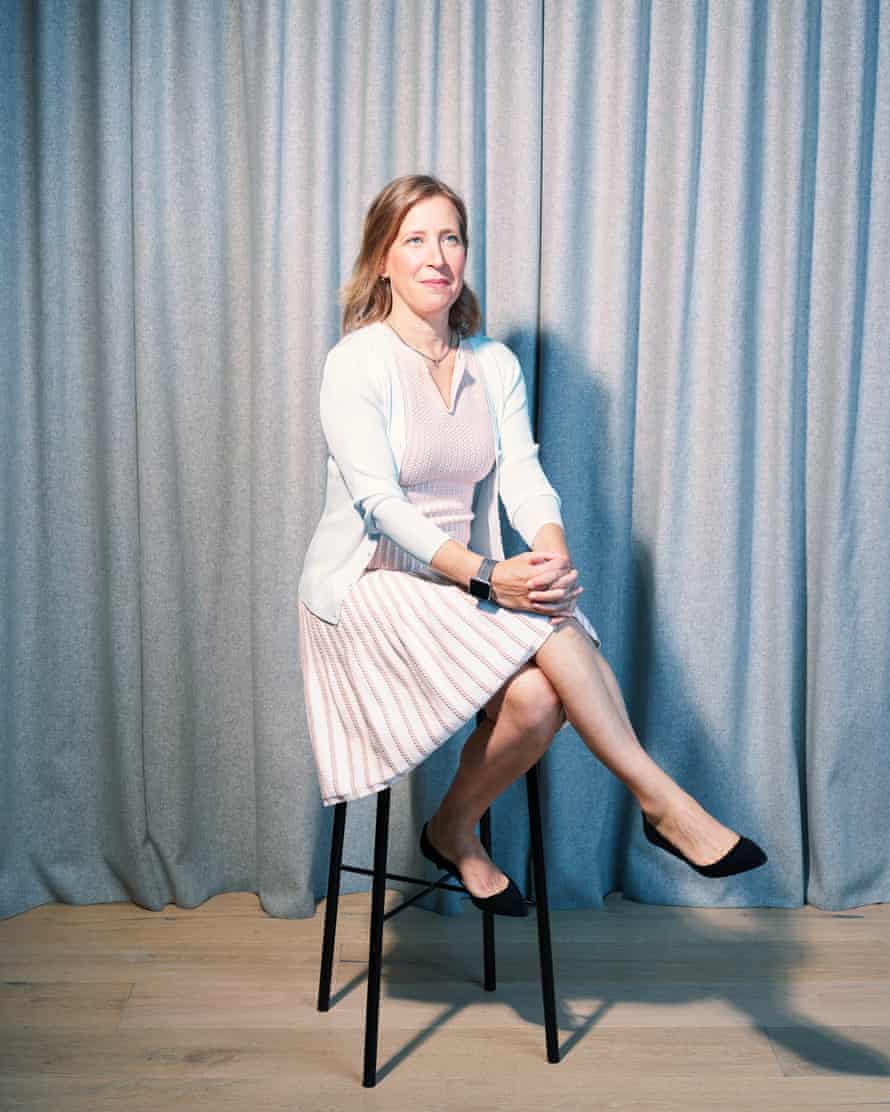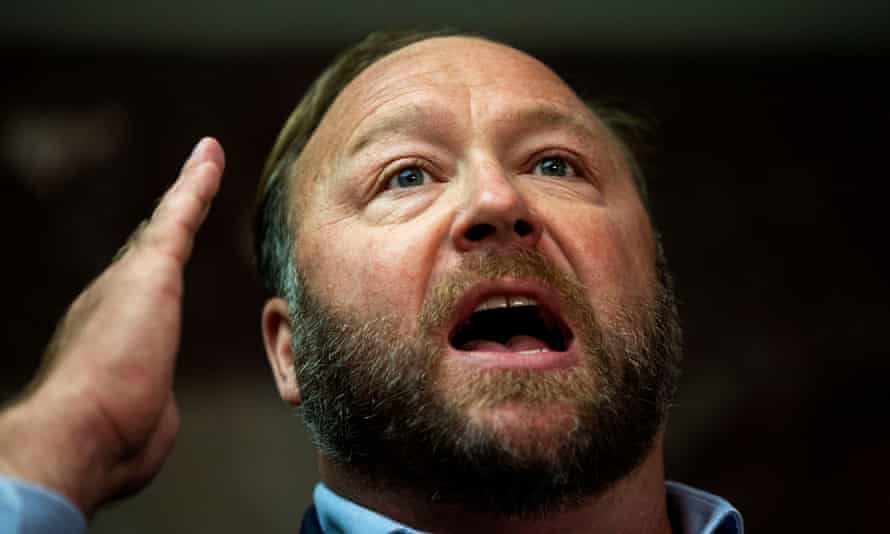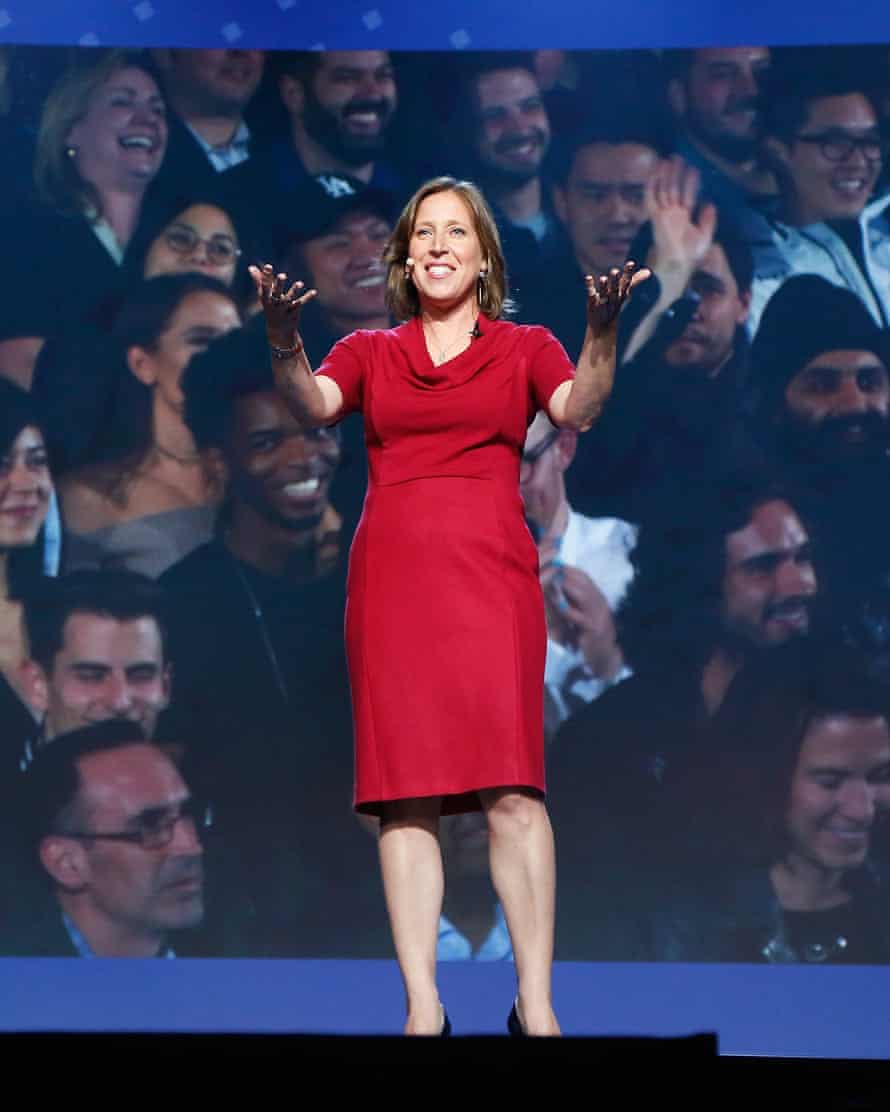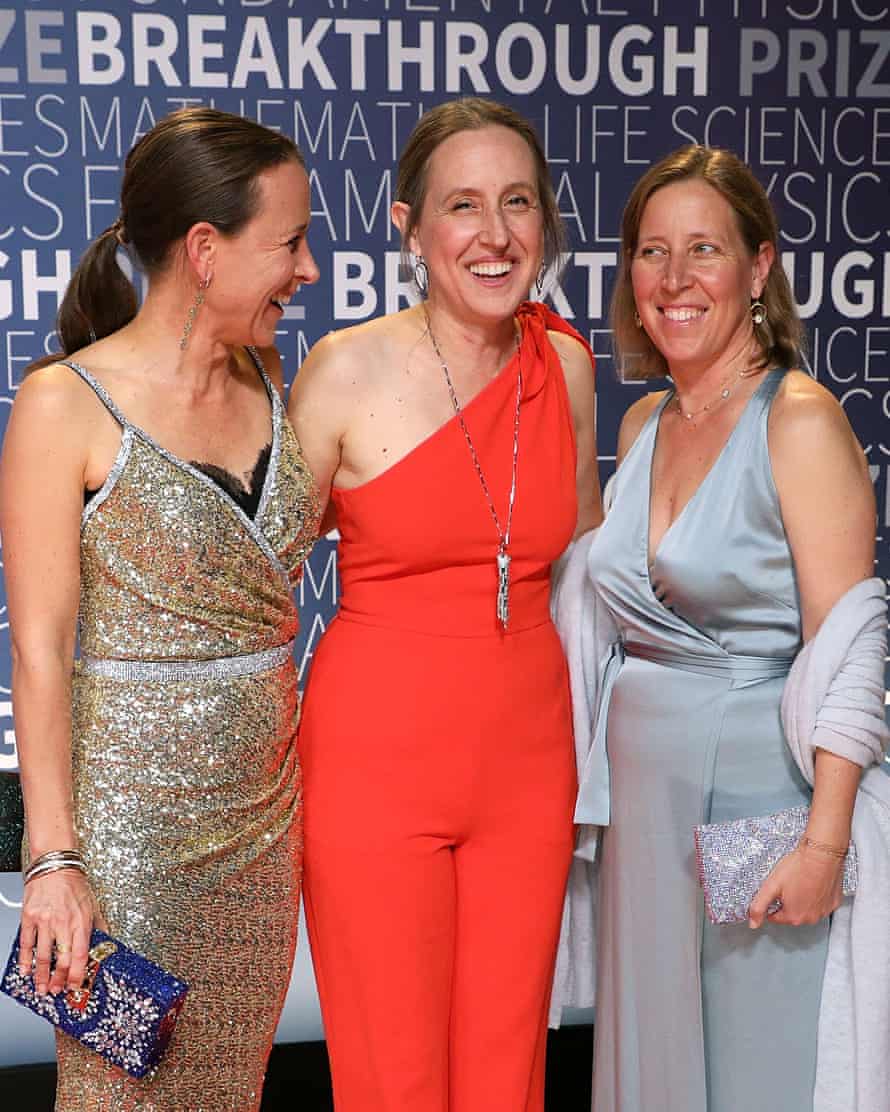Where Does Youtube Draw The Line Hate Speech
I northward YouTube'southward fashionable fundamental London "space", where good-looking immature people mill around and assist themselves to the well-stocked free kitchen, there is a noticeboard that asks staff and visitors: What could we do better? On one of the sticky notes, someone has written "Nothing!!" Information technology would be reassuring for the executives who run the video site if that were true, although not many would agree that it is. Susan Wojcicki, YouTube'due south CEO, who is in town for a iii-week tour of Europe, is ane of the about impressive and powerful women in tech – and also one of the near beleaguered.
We meet in i of the studios, where YouTubers with more than 10,000 subscribers can make videos, and sit down on sofas in a set up with a imitation brick-wall backdrop, which gives a slightly unnerving sense of fake cosiness. Wojcicki (pronounced "Wo-jisky") seems friendly but businesslike; chatty, simply is careful about what she says. There is a lot to talk about: sexism in tech, the ability of social media, existence a working parent of five – and especially the crises that have engulfed the company she runs, particularly this yr.
Concluding month, the Washington Postal service reported that the Us Federal Trade Committee had finalised a multimillion-dollar fine for YouTube's owner, Google, after an investigation found that the site had been collecting the information of children under 13. In May, the Vox journalist Carlos Maza complained, in a tweet that went viral, that he had been the repeated victim of homophobic and racist abuse by one of YouTube'southward stars (or "creators", in company speak), the conservative commentator Steven Crowder. In an open letter, 145 employees of Google, YouTube and their parent visitor, Alphabet, called for San Francisco Pride to pass up Google'south sponsorship considering it had repeatedly ignored their calls to take more seriously what they viewed equally hate speech communication on YouTube and other Google platforms.
Before this, in March, YouTube was criticised for failing to deed rapidly enough to remove footage of the New Zealand mosque attacks, which had flooded the site. A month earlier, it was revealed that paedophiles had been using the comments section nether videos of children to communicate with each other.
The platform has hosted violent or sexually explicit videos made to look similar content for children (such as Peppa Hog animations), while one of its biggest stars, Logan Paul, once posted a video in which he posed adjacent to a human who had killed himself. Elsewhere on the site, conspiracy theories proliferate. Researchers claim it is a identify where far-right commentators, white supremacists and men's rights activists accept radicalised legions of immature white men. Politicians are circling, concerned near how powerful tech companies have become and talking near breaking upward the biggest.
In June, YouTube announced new anti-hate spoken language policies in an attempt to accost some of the concerns. Why did it take so long? "We've always had an anti-hate speech policy," says Wojcicki. "YouTube has had customs guidelines from the very beginning and a number of guidelines involving hate and [incitement to] violence. What nosotros take found is that, with every policy we make, there is content that volition become borderline, or will detect means to brim around those policies. What we were doing was tightening [rules] we already had."
Nether the new rules, certain events – such as the Holocaust and the Parkland school shooting – are at present protected, so users tin can't post videos denying they happened. "We also defined the language in a way that is more precise and more clear, so you could non employ whatsoever protected group … to justify violence, exclusion, separation, bigotry." The visitor has targeted what it calls "borderline" content – videos that brim dangerously close to violating its policies – she says, with the platform removing comments and not allowing the videos to appear in its recommended section, the cardinal feature that drives views.
But information technology'south an uphill boxing; every minute, more than 500 hours of video is uploaded. The company employs 10,000 man moderators – as well as computers – to sift through it all. Surely the clean-up chore is besides large for them to go a handle on it? "I think nosotros've made tremendous progress," says Wojcicki. In the first quarter of 2022, they removed 8.3m videos, she says. "The machines get more and more sophisticated as we get better at identifying that content, which means nosotros tin detect information technology faster than before. Over 75% of the content that we're removing with machines, we find and remove without even a unmarried view." But is it actually possible to delete plenty? "Yes, I think it is," she says. "I've seen the progress we've fabricated and I believe we will continue to make more than progress."

Wojcicki'southward target, when she became CEO in 2022, was to get people watching a billion hours' worth of video a solar day – a target she met in 2022. Merely critics say that YouTube'southward unabridged business model is based on increasing spotter fourth dimension, and that videos trading in outrage and extremism drive this by engaging people to stay on the site longer.
Does she agree with that? "No, I don't concur," she says, with a tight smile. "Nosotros've designed YouTube to be a platform that generates loftier-quality content and experiences, where people are learning, or laughing, discovering people like them. Philosophically, that's the sort of content we're leaning into. Only besides nosotros are an advertising-supported platform, and advertisers do not want to run on content that is extremist or that leads to whatever kind of controversial societal behaviour."
Simply the platform still benefits from claiming it has more than 2 billion agile users – 73% of Americans use it, according to the Pew Research Middle, more than whatsoever other social media platform – even if many come up to lookout man unsavoury and inflammatory content. Is that not a problem? She asks which blazon of videos, although it is inconceivable that she doesn't know what I hateful. The "alt-right" stuff, the Alex Jones stuff, I say. (I could have added the videos glorifying Isis, since removed, that led to an exodus of advertisers in 2022.)
"Alex Jones isn't on our platform," says Wojcicki, of the far-correct conspiracy theorist who had nigh 2.5 one thousand thousand subscribers. Only he was, until he was banned last year (fans still upload his shows to the platform). "Only he'southward non any more," she says. "I think it'south important to remember that news or news commentary [is] a very pocket-size pct of the number of views nosotros take. The vast majority of YouTube is a combination of influencers who are focused in areas similar one-act, dazzler, how-to, gaming." Music is another, she says. "If you look at some of the content y'all referenced, that is an extremely small role of the platform."

Simply hasn't it been dangerously influential? She pauses. "Wait, it'southward a very small percentage of our views, and the style that we call back about information technology is: 'Is this content violating one of our policies? Has it violated anything in terms of hate, harassment?' If information technology has, we remove that content. Nosotros keep tightening and tightening the policies. Nosotros also get criticism, just to exist articulate, [most] where practice you depict the lines of gratis speech and, if you describe it too tightly, are yous removing voices of society that should be heard? We're trying to strike a balance of enabling a broad fix of voices, merely also making sure that those voices play past a set up of rules that are salubrious conversations for society."
For all her careful, frustratingly corporate answers, Wojcicki is in an almost impossible position. Aside from the gargantuan job of trying to sift through the never-ending torrent of content, she has to debate with the fact that removing far-right commentators' videos turns them into free-speech martyrs. She also has to keep "creators", many of whom make a handsome living through the site, happy. I accept no reason to disbelieve Wojcicki when she says "responsibility has been my number ane priority". The question is whether information technology is a chore beyond her – and whether Google volition tolerate changes that result in lower profits.
Wojcicki, 51, is the eldest of 3 sisters, all rooted in Silicon Valley: her youngest sister, Anne, is the founder of the genetic-testing company 23andMe and was married to Google'south co-founder Sergey Brin; their middle sister, Janet, is a professor. They are the daughters of a refugee – their grandfather was an opposition leader in Poland and their father Stanley fled when he was eleven, smuggled aboard a Swedish coal tanker with his mother and blood brother. They went to the US, where he became a physicist and the chair of Stanford Academy'south physics department. Their mother, Esther, is a renowned teacher. "I think i of the virtually valuable aspects of our childhood was growing upwardly on the Stanford campus," says Wojcicki. "Stanford has all of its faculty live in the same location, so I grew up where all of my neighbours were professors." One was the late George Dantzig, the celebrated mathematician. "I didn't realise what he had done academically until I was at college – I had always just known him equally the person who lived side by side door."

Wojcicki was influenced past the passion she saw around her, she says: "University professors are mostly people who intendance deeply nigh a topic." Was at that place overwhelming pressure level to succeed, growing up aslope so many high-achievers? "I didn't feel pressure in the way people unremarkably define success, whether that'south with fame or income," she says. "University professors are always taking a cutting in income to practise what they want to do; they're dedicated to their field. I suppose there was some pressure to do what was interesting, to observe an area that was meaningful."
As a child, she wanted to exist an artist. She studied literature and history at Harvard, not the typical background of tech CEOs, although her business organisation brain was apparent from an early on age – she had a childhood hustle selling homemade spice ropes (plaited yarn threaded with spices) before picking upwards graduate degrees in business and economic science. "I decided to take my first informatics class when I was a senior in college. My whole babyhood was about arts and being creative – I but loved to make and create things – and it was really only in my senior year that I realised computers and software enabled you lot to make content, and I saw the creative aspect of it. I had this view beforehand that it was a very boring topic." This is why she loves YouTube's creators, she says: "That interest is what still draws me to engineering science."
After higher, Wojcicki worked in marketing for Intel. A common friend introduced her to Larry Page and Sergey Brin, who rented Wojcicki's garage, where they built their search engine, Google, shortly expanding into three footing-floor bedrooms in her house (Wojcicki and her husband, strapped for cash, were pleased to have help with the mortgage).
Wojcicki joined Google in 1999, as the visitor'south 16th employee. "Everyone said: 'Why are you joining some other search engine? Information technology'southward non going to be successful; there are already mode as well many search engines.' Only I saw right away that Google was offer an power to find information that was unparalleled." However, it was a risk to join this small visitor. "I was v months' pregnant, and I had just bought a business firm, and I had student loans," she says with a laugh. "I think it gets back to who I am every bit a person – I saw the net was coming, I saw information technology was going to exist big, and I felt at home at Google considering it reminded me of the mission of a lot of universities, which is to enable resources for people to acquire, to self-empower by studying and [giving] access to information."

She became Google's marketing manager, and then a senior vice-president overseeing advertising, which is instrumental in driving the vast majority of its gigantic profits – $9.2bn (£7.6bn) in the latest quarter. Wojcicki was in charge of Google'southward video platform in 2005 when she realised a startup, YouTube, was outperforming information technology. She advised Google to buy it – which it did, in 2006, for $1.7bn. (The billionaire investor Mark Cuban said at the time that "anyone who buys [YouTube] is a moron", predicting that the site would exist "sued into oblivion" for hosting copyrighted content.) In 2022, she became its CEO, growing it into a business that is now worth about $160bn.
Although Wojcicki is one of the most influential people in tech, she has maintained a low profile, simply seems well-regarded in the industry as a steady and diligent leader. She has been vocal nigh the demand to get more than women into tech and into leadership positions (Sheryl Sandberg, formerly at Google and now Facebook's chief operating officeholder, has named Wojcicki as a part model). Under Wojcicki, the proportion of female staff at YouTube has increased from a quarter to a tertiary, she says, "and that includes our leadership".
Why have so few women fabricated information technology to her level? "If y'all look at the pipeline of women graduating with information science degrees, information technology's a much smaller number [than men]," she says. "In the The states, about 20% are women. That just means that, when you lot get started, there is a smaller pool of women who accept those capabilities. The challenge is getting that network started. It'south always difficult if you're the first adult female, the simply woman, but if you're working in an organisation where there are a significant number, and not just in the entry-level positions, then younger women understand that they can also achieve these leadership roles."
One of the important factors in keeping women, says Wojcicki, is a generous maternity go out policy. Google offers 6 months' paid leave in the Us, where in that location is no federal entitlement to whatever. "Xx-five per cent of American women come back to piece of work after 10 days [of having a infant], which is a crazy number," she says. "Subsequently I had my last kid, I was thinking on day x: 'How would I feel if I had to come back correct now?' And I thought: 'I wouldn't – I'd rather quit.'"
How much sexism has she experienced in her career? "I feel similar I've been supported," she says, then pauses. "For the most part. But a lot of times in that location are micro-aggressions that people aren't always enlightened of and that can take a cumulative consequence." Men have spoken over her, or not taken on lath what she has said, or non taken her seriously. "And so I remember I've too developed techniques, over 20 years of being in the industry, of learning how to have my words taken seriously, and how to get attention."
Sometimes, she says, she will merely call it out. "Or I'll detect a manner to get people to really listen. What I find is, you can't say comments in a timid, unsure way – no one's going to mind to y'all and no one'southward going to take you seriously. You have to be able to land your opinion in a mode that is confident." Getting attention is of import, too: "So, y'all have to say something like: 'No, I completely disagree with your signal of view, you're going in the incorrect direction. Let me tell y'all what I think is the right stride for the time to come.' And and so y'all've opened the door and people are paying attention." Tech is getting more diverse, she says, which is vital for guild. "It has get such an important force of change in then many parts of our economic mural," she says. "If simply 25% of people coming into tech are women, then in that location are some stories and some perspectives that are not being shared."
Wojcicki's children range in age from four to late teens. They do lookout YouTube, she says (the dedicated kids' version for the younger ones). How exercise she and her married man, a Google executive, manage their children'south screen time? "It's always important to accept balance," she says. "What is important to me is that kids learn how to manage applied science responsibly. Simply like y'all talk to your kids about what you practice when you go out on the street, you demand to accept a conversation with them most safe on the internet, and besides find a fashion to manage screen time and residue that with other activities."
Are at that place arguments over screen fourth dimension? "I have times when I have away all my kids' phones, especially if we're on a family unit vacation, because I desire people to collaborate with each other. Then, I have abroad their phones and say: 'We're all going to focus on being present today.' It comes back to balance – people need to acquire when it is a time [to be] focused in the chat, and when it is OK to go and spotter videos or exercise other activities on the internet."
At what historic period did they get phones? "When my kids started to exist in a position when they were on their own, taking a omnibus or going places, it was useful for them to take a phone," she says. Once, her girl got "stuck somewhere and she didn't take whatsoever manner to reach usa. There are moments when it becomes important for them to have a phone. I think middle school [from about the historic period of 11] is a reasonable signal to get-go educating them about it, simply besides a lot of times you lot tin take it away. High school is harder – y'all're dealing with children who are getting close to going to college, and you have zero control when that happens."
She doesn't like to manage their screen fourth dimension too much, she says, preferring to let her children create "self-control methods. Telly was the same when I was growing up. I was taught that, certain, some Telly is enjoyable, simply it needs to exist balanced with sports, school, homework, reading and other activities."
Wojcicki is worth a reported $500m. Is information technology hard to maintain any kind of "normal" life for her children? "I work really hard to give my kids a normal life," she says. "In some ways, that'southward very manageable, because those are my values – hard work, doing something meaningful. I do talk to my kids about a lot of the challenges we face at work, because these are issues of society and it's interesting to hear their point of view. I work incredibly difficult to brand sure my children are hard-working, respectful and live balanced lives, and I endeavour to gear up that case."
A typical day involves getting up at 7am or 8am to do some practise ("I'chiliad not a morning person," she adds with a smile), taking the children to schoolhouse and getting to work between 9am and 10am. Sometimes, she stops for luncheon, simply commonly she has a lunch meeting. She tells me nigh her working style, using impenetrable phrases such as "right processes", simply adds: "I'1000 not a person who tries to micromanage." And she tries to become abode for dinner.
She sets a few rules for herself when she is at home. "I do switch off, and I think that'southward incredibly of import," she says. "If in that location'south a crisis, then I understand I need to be at that place and I need to be on top of that situation, but my goal is to brand certain nosotros don't have crises. In general, I endeavour to have evenings where I'm not looking at my phone or doing e-mail or work." That said, she does bank check her email at some signal later, because "things accept normally happened in those couple of hours. I also endeavour really hard to take a break on the weekend, and I try not to send emails to my team, because I want them to have a break. I'm a laic that taking breaks leads to college productivity in the end and more than longevity."
Does she have time for annihilation else? "I like to garden," she says. "I like animals." She has chickens and goats. "I like to abound things. I dearest getting away by doing something completely different from engineering science, whether it'due south learning about bees and having honey, or learning about unlike types of chickens, or varieties of fruit." It sounds lovely, I say. She visibly relaxes and says: "Information technology is."
The day before we meet, the tech site Gizmodo publishes a slice on how extremist channels remain on YouTube, despite the new policies. In the face of adequately constant criticism, does Wojcicki ever feel like walking away? "No, I don't. Considering I feel a commitment to solving these challenges," she says. "I care near the legacy that we leave and about how history will view this point in fourth dimension. Here's this new technology, nosotros've enabled all these new voices. What did nosotros practise? Did we decide to shut it down and say only a small-scale set of people volition have their voice? Who will decide that, and how will it be decided? Or do we find a fashion to enable all these different voices and perspectives, but observe a mode to manage the abuse of it? I'm focused on making sure we can manage the challenges of having an open platform in a responsible way."
Still, it is difficult to resist picturing Wojcicki in her garden on a twenty-four hour period off, attempting to nurture something beautiful while holding back the unstoppable force of weeds that just go on coming.
Source: https://www.theguardian.com/technology/2019/aug/10/youtube-susan-wojcicki-ceo-where-line-removing-voices-heard
Posted by: kingstonobleas.blogspot.com


0 Response to "Where Does Youtube Draw The Line Hate Speech"
Post a Comment